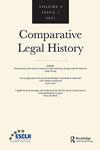现代早期的不朽(和本土)习俗:欧洲和美洲
IF 0.5
Q2 LAW
引用次数: 2
摘要
本文询问,对欧洲法律的更熟悉将如何改变我们对殖民地的看法,尤其是对拉丁美洲的看法。集中研究欧洲和美国领土上的古代和本土习俗,认为这些习俗不一定是古代或真实的。相反,他们授权在一个与我们截然不同的法律世界中对一般规则进行法律例外。他们维持了地方司法领域的存在和合法性,同时也维持了共同的、跨基督教的法律理解的重要性。通过展示从业者、法学家、神学家和学者在现代早期及其后对习俗的看法,目的不是批评其他人的所作所为,而是提供一个有用的框架,使我们能够有意义地融合历史学家已经恢复的多种声音,以及为从事这些问题工作的人提供必要的背景。本文章由计算机程序翻译,如有差异,请以英文原文为准。
Immemorial (and native) customs in early modernity: Europe and the Americas
This text asks how a greater familiarity with European law would change our vision of colonial territories, most particularly, Latin America. Concentrating on the study of immemorial and native customs in both European and American territories, it argues that these customs were not necessarily ancient or authentic. Instead, they authorised making legal exceptions to the general rule in a legal universe that was dramatically different from our own. They sustained the existence and legitimacy of a local juridical sphere while also maintaining the importance of a common, cross-Christian, legal understanding. By showcasing what practitioners, jurists, theologians, and scholars have said about customs during the early modern period and since, the aim is not to criticise what had been done by others but to offer a useful framework that would allow us to meaningfully merge the multiplicity of voices historians have already recovered, as well as supply those who work on these issues with the necessary background.
求助全文
通过发布文献求助,成功后即可免费获取论文全文。
去求助
来源期刊
CiteScore
1.70
自引率
0.00%
发文量
20
期刊介绍:
Comparative Legal History is an international and comparative review of law and history. Articles will explore both ''internal'' legal history (doctrinal and disciplinary developments in the law) and ''external'' legal history (legal ideas and institutions in wider contexts). Rooted in the complexity of the various Western legal traditions worldwide, the journal will also investigate other laws and customs from around the globe. Comparisons may be either temporal or geographical and both legal and other law-like normative traditions will be considered. Scholarship on comparative and trans-national historiography, including trans-disciplinary approaches, is particularly welcome.

 求助内容:
求助内容: 应助结果提醒方式:
应助结果提醒方式:


